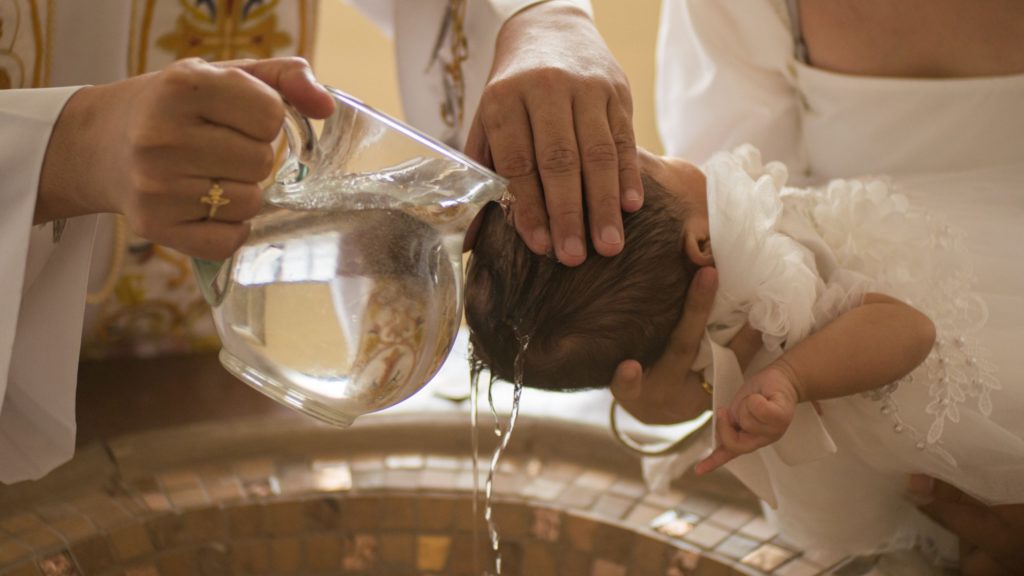The Vatican’s doctrine office has said an adult who identifies as transgender can receive the sacrament of baptism under the same conditions as any adult, as long as there is no risk of causing scandal or confusion to other Catholics.
The Vatican also said that children or adolescents experiencing transgender identity issues may also receive baptism “if well prepared and willing.”
The document answering these and other sacrament-based questions for those who identify as transgender and people in same-sex relationships was generated in response to questions posed to the Dicastery for the Doctrine of the Faith (DDF) in July by Bishop Giuseppe (José) Negri of Santo Amaro in Brazil. The guidance comes amid ongoing discussions within the Catholic Church about pastoral care for the LGBTQ community in light of Francis’ focus on accompaniment and synodality.
The dicastery’s response is dated Oct. 31 and signed by DDF Prefect Cardinal Victor Fernández and Pope Francis. It is available on the Vatican website in Italian.
The Vatican also responded to questions about whether transgender-identifying people or those in homosexual relationships can be godparents or witness a marriage, and whether children adopted or born through assisted reproduction to same-sex couples can be baptized.
To the last question, the DDF cited paragraph 868 of the Code of Canon law, and said “for the child to be baptized there must be a well-founded hope that he or she will be educated in the Catholic religion.”
The Vatican's explanation
On the question of those who identify as transgender and their reception of the sacrament of baptism, the dicastery gave some notes for consideration, “especially when there is some doubt about the objective moral situation in which a person finds himself, or about his subjective disposition toward grace.”
It went on to explain that the Catholic Church teaches that baptism received without repentance for grave sins, while it gives an indelible sacramental character, does not bestow sanctifying grace.
The Vatican quoted the Catechism of the Catholic Church, St. Thomas Aquinas, and St. Augustine of Hippo to explain that once a person has the right disposition, that is, has repented of any grave sins, the sacramental character of baptism “is an immediate cause which disposes one to receive grace.”
“Thus we can understand why Pope Francis wanted to emphasize that baptism ‘is the door which allows Christ the Lord to dwell in our person and allows us to be immersed in his Mystery,’” the DDF said, quoting an April 11, 2018 general audience by Pope Francis.
“This concretely implies,” it went on, quoting Francis’ 2013 apostolic exhortation Evangelii Gaudium, “that ‘nor should the doors of the sacraments be closed for simply any reason. This is especially true of the sacrament which is itself ‘the door’: baptism. ... The Church is not a tollhouse; it is the house of the Father, where there is a place for everyone, with all their problems.’ ”
The DDF concluded that even if there are doubts about a person’s objective moral situation or subjective disposition toward grace, “the faithfulness of God’s unconditional love, capable of generating an irrevocable covenant even with the sinner” should not be forgotten.
“In any case, the Church should always call [someone] to live out fully all the implications of the received baptism, which must always be understood and unfolded within the entire journey of Christian initiation,” it said.
Other related questions
The doctrinal office said a transgender-identifying person who has undergone hormonal treatment or sex-reassignment surgery can fulfill the role of godfather or godmother for a baptism “under certain conditions,” but added that such a role is not a right and should not be allowed if there is danger of causing scandal or confusion to the Church community.
It also said there was nothing in current Church law that prohibits people who identify as transgender or cohabiting homosexual people from acting as witnesses of a marriage.
In answer to a question about whether a cohabiting homosexual person can be a godparent, the document cited the Church’s Code of Canon Law, paragraph 874, to say a godparent can be anyone who possesses the aptitude and “who leads a life of faith in keeping with the function to be taken on.”
It stated that a homosexual person living, not a “simple cohabitation,” but a “stable and declared more uxorio" in the manner of a husband and wife“well recognized by the community,” is “a different case.”
Every case requires “pastoral prudence,” it went on to say, in order to safeguard the sacrament of baptism, and “it is necessary to consider the real value that the ecclesial community confers on the duties of godfather and godmother, the role they play in the community, and the consideration they show toward the teaching of the Church.”
The DDF also said it can be taken into account whether there are other people in the extended family who can guarantee the proper transmission of the Catholic faith to the baptized person without holding the role of godparent.

